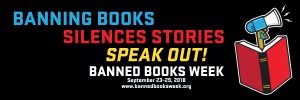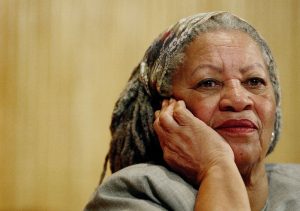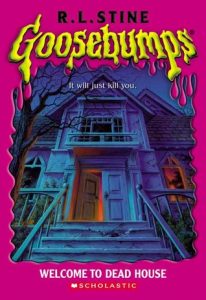
It’s Banned Books Week! BBW is an annual event celebrating the freedom to read. Banned Books Week was launched in 1982 in response to a sudden surge in the number of challenges to books in schools, bookstores and libraries. Typically held during the last week of September, it highlights the value of free and open access to information. Banned Books Week brings together the entire book community — librarians, booksellers, publishers, journalists, teachers, and readers of all types — in shared support of the freedom to seek and to express ideas, even those some consider unorthodox or unpopular.
The most challenged books of 2017 can be found on ALA’s website.
Though there are no Ohio-related books this year, there have been several included many times in the past. Some of them may surprise you!

Photo credit: Guillermo Arias/AP
Among the most frequently banned or challenged books in America are titles by celebrated, Pulitzer Prize-winning novelist Toni Morrison, who was born and raised in Lorain, Ohio. Her novels Beloved, Song of Solomon, and The Bluest Eye are multi-award winning stories about people of color; in particular, women of color. The American Library Association has pointed out the overwhelming tendency to ban books by writers of color; in 2016, the spotlight week was specifically shone on these writers in an attempt to “celebrate literature written by diverse writers that have been banned or challenged, as well as explore why diverse books are being disproportionately singled out in the first place.”
Morrison’s books are frequently singled out for sexual content and violence without considering the context. The Bluest Eye, published in 1970, is an unflinching look at racism and domestic violence. Encouraging students to read this book, and other controversial literature, encourages them to start a dialogue about subjects which are too often ignored. In this era of movements like #TimesUp and #MeToo and the current political climate, The Bluest Eye is just one book that may foster students’ critical thinking skills. Morrison herself, when she accepted her Nobel Prize for Literature in 1993, spoke of “Laureates yet to come,” those readers who confront hard-to-tell stories head on, and may grow up to change the world, and tell their own world-changing stories.
“Their voices bespeak civilizations gone and yet to be; the precipice from which their imaginations gaze will rivet us; they do not blink nor turn away.”
Another controversial Ohio author is Dav Pilkey, whose Captain Underpants books are beloved by millions of kids worldwide. He created this video in 2014 to express his feelings on banned books.
Captain Underpants has been banned frequently from schools, even reaching the #1 spot on ALA’s annual banned books list in 2012. Pilkey himself pointed out that his books “contain no sex, no profanity, no nudity, no drugs, and no graphic violence (at least nothing you wouldn’t see in a 1950’s Superman comic book).” So why are they banned so often? Pilkey thinks it’s a snap judgment based on the cover and title, and the penchant towards directing children to “real literature” rather than comics, despite the recognition in recent years of graphic novels as award-winning books of art and literature.
“My goal with Captain Underpants is to make kids laugh and to give children (and especially reluctant readers) a positive experience with reading at a crucial time in their development (ages 7 to 10). Children in this age group who hate to read are in great danger of becoming functionally illiterate adults. So when a child connects to a book — even if it’s a book that we as adults might not care for — it’s a BIG DEAL!”

Photo credit: Scholastic
Coming in at #94 on the list of Top 100 Banned/Challenged Books in 2009 was the Goosebumps series by R.L. Stine. Stine grew up in Bexley, Ohio and graduated from Ohio State University. He began his career by writing humor books for children and created the humor magazine Bananas. Stine wrote his first horror novel for young people in 1986. He went on to create the Fear Street series in 1989 and Goosebumps in 1992. His books have sold more than 350 million copies, and the Goosebumps series has been translated into 32 languages. Like Captain Underpants, it also inspired a film, with a sequel coming this October. Stine created an endowment fund for creative writing in his hometown of Bexley, received the Ohioana Career Award in 1999, and was a featured author at the 2009 Ohioana Book Festival.
Goosebumps has been banned because parents feel they are too frightening, or that they contain “satanic” or “occult” themes. With titles like It Came From Beneath the Sink! and Go Eat Worms! it seems odd that these complaints are taken seriously. Indeed, Stine says that he considers the banning of his books to be a point of pride.
“It is a badge of honor to have people try to ban your books from schools and school libraries, only because it means your books have become popular and are being noticed. Unpopular books seldom get banned. I’ve never noticed any kind of sales decrease because of these censorship campaigns. Usually they prove to be good publicity.”
Ultimately, Banned Books Week is a celebration of the freedom to read. The 2018 theme, “Banning Books Silences Stories” is a reminder that everyone needs to speak out against the tide of censorship. For more information on Banned Books Week, previous lists of banned/challenged books, and other ways you can celebrate the freedom to read, visit the Banned Books Week website.
